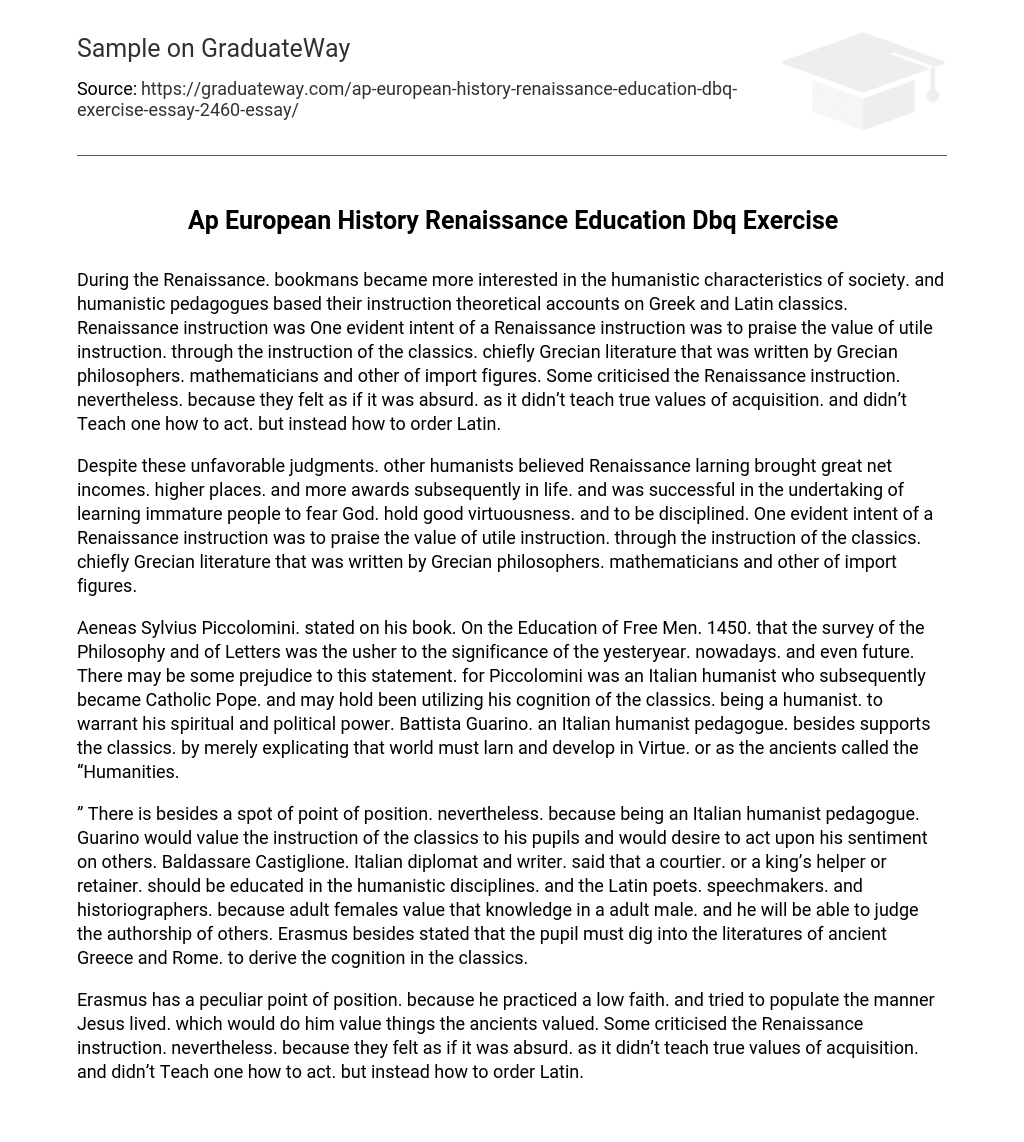During the Renaissance. bookmans became more interested in the humanistic characteristics of society. and humanistic pedagogues based their instruction theoretical accounts on Greek and Latin classics. Renaissance instruction was One evident intent of a Renaissance instruction was to praise the value of utile instruction. through the instruction of the classics. chiefly Grecian literature that was written by Grecian philosophers. mathematicians and other of import figures. Some criticised the Renaissance instruction. nevertheless. because they felt as if it was absurd. as it didn’t teach true values of acquisition. and didn’t Teach one how to act. but instead how to order Latin.
Despite these unfavorable judgments. other humanists believed Renaissance larning brought great net incomes. higher places. and more awards subsequently in life. and was successful in the undertaking of learning immature people to fear God. hold good virtuousness. and to be disciplined. One evident intent of a Renaissance instruction was to praise the value of utile instruction. through the instruction of the classics. chiefly Grecian literature that was written by Grecian philosophers. mathematicians and other of import figures.
Aeneas Sylvius Piccolomini. stated on his book. On the Education of Free Men. 1450. that the survey of the Philosophy and of Letters was the usher to the significance of the yesteryear. nowadays. and even future. There may be some prejudice to this statement. for Piccolomini was an Italian humanist who subsequently became Catholic Pope. and may hold been utilizing his cognition of the classics. being a humanist. to warrant his spiritual and political power. Battista Guarino. an Italian humanist pedagogue. besides supports the classics. by merely explicating that world must larn and develop in Virtue. or as the ancients called the “Humanities.
” There is besides a spot of point of position. nevertheless. because being an Italian humanist pedagogue. Guarino would value the instruction of the classics to his pupils and would desire to act upon his sentiment on others. Baldassare Castiglione. Italian diplomat and writer. said that a courtier. or a king’s helper or retainer. should be educated in the humanistic disciplines. and the Latin poets. speechmakers. and historiographers. because adult females value that knowledge in a adult male. and he will be able to judge the authorship of others. Erasmus besides stated that the pupil must dig into the literatures of ancient Greece and Rome. to derive the cognition in the classics.
Erasmus has a peculiar point of position. because he practiced a low faith. and tried to populate the manner Jesus lived. which would do him value things the ancients valued. Some criticised the Renaissance instruction. nevertheless. because they felt as if it was absurd. as it didn’t teach true values of acquisition. and didn’t Teach one how to act. but instead how to order Latin. Juan Luis Vives. a Spanish humanist. supported the thought that adult females should non larn much. but instead merely plenty to learn her good manners and literature from scriptural bookmans.
There is a great trade of prejudice in this thought. because being Spanish. Christian. and male. Vives would non hold with adult females being educated. due to the fact that Spain was really conservative. particularly after the Reconquista. Michel de Montaigne argued that the “absurd” educational system taught pupils the incorrect values. by learning them that composing the best Grecian and Latin was more of import the which books contain the best sentiments. Montaigne’s point of position comes from the fact that he is a skeptic and criticizes legion things. so it is likely that he would knock the educational system.
John Brinsley. an English headmaster objected that bookmans at 15 or 16 old ages of age due non understand true cognition. but alternatively the can merely wrote Latin that means small. Brinsley had an interesting position. because he was a headmaster himself and saw these actions firsthand. from his immature bookmans. Another unfavorable judgment of the school system was that such survey weakens the organic structure. and prevents people from obtaining occupations necessary to society. such as farming occupations. soldiers. and merchandisers.
John Amos Comenius. and educational reformist. besides said supported the thought that larning did non assist people plenty in life. because pupils learned much grammar. rhetoric. and logic. alternatively of things that would fix them for action subsequently in life. Despite these unfavorable judgments. other humanists believed Renaissance larning brought great net incomes. higher places. and more awards subsequently in life. and was successful in the undertaking of learning immature people to fear God. hold good virtuousness. and to be disciplined.
Francesco Guicciardini stated that things that seem more cosmetic than significant to adult male. such as accomplishments like the humanistic disciplines. led to a good repute of work forces and open the manner to prefer a princess. These accomplishments besides led to great net incomes and awards. The position in this statement comes from the fact that he was a politician. and witnessed how his instruction in these humanistic disciplines helped him to better his rank in society. derive a larger net income. and other benefits.
Some besides supported the Renaissance instruction from a spiritual side by explicating that kids who go to school learned virtuousness. subject. and to fear God. which were of import Christian values. In an analysis of the per centum of justnesss of the Peace who attended university. around 1562. in Kent. merely two per centum of justnesss had attended university. This figure increased dramatically in 1636. when an astonishing 60 eight per centum of justnesss had attended university. This clearly demonstrated the value of a Renaissance instruction. and how it led to higher ranks. for case. justnesss.





